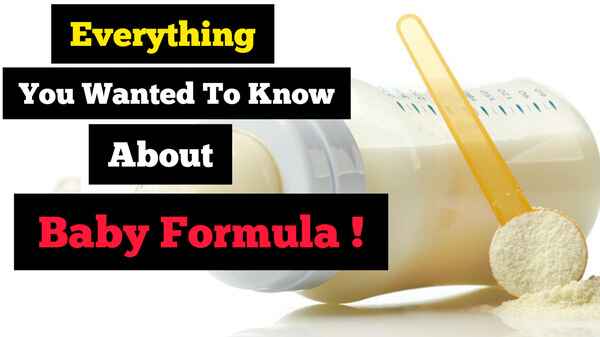As a new parent, you may find yourself facing many decisions, including whether to feed your baby formula. Understanding baby formula and its role in your baby’s nutrition is crucial for providing them with proper care.
Let us cover everything you need to know about baby formula in simple language by providing you with essential information to make informed decisions for your little one’s well-being. (Source)
What is Baby Formula?
Baby formula is a manufactured substitute for breast milk that aims to provide infants with the necessary nutrients for healthy growth and development. It comes in various forms, including powder, liquid concentrate, and ready-to-use. Baby formula is designed to mimic the composition of breast milk as closely as possible, ensuring that your baby receives the appropriate balance of proteins, fats, carbohydrates, vitamins, and minerals. (Source)
Facts and Figures about Baby Formula:
1. Baby formula is a safe and nutritious alternative to breastfeeding when breastfeeding is not possible or chosen. (Source)
2. The World Health Organization (WHO) recommends exclusive breastfeeding for the first six months of a baby’s life. However, formula feeding can be a suitable option if breastfeeding is challenging or unavailable. (Source)
3. In 2019, the majority of infants (83.2%) began their lives receiving some breast milk, with 78.6% still receiving breast milk at one month old. By six months, 55.8% of infants continued to receive breast milk, and 24.9% were exclusively breastfed. While families often encounter challenges with breastfeeding, the data indicate that most infants start with breastfeeding, and a significant number continue to receive breast milk at six months. (Source: CDC Report Card)
4. Baby formula is regulated by governmental agencies, such as the Food and Drug Administration (FDA), to ensure safety and nutritional standards are met.
5. There are different types of baby formula available, including cow’s milk-based, soy-based, hydrolyzed (for infants with cow’s milk protein allergy), and specialized formulas for specific medical conditions.
6. Most commercially available baby formulas are fortified with essential nutrients, such as iron, calcium, and vitamins.

7. Powdered baby formula is the most cost-effective option and can be safely stored for an extended period.
8. Liquid concentrate and ready-to-use formulas offer convenience but are typically more expensive.
9. It is essential to follow the instructions on the formula packaging for proper preparation and handling to prevent contamination and ensure your baby’s safety.
10. Formula-fed babies may have slightly different bowel movements compared to breastfed babies. Formula-fed stools are usually firmer and less frequent.
11. The American Academy of Pediatrics recommends sterilizing bottles and nipples before each use during the first few months to reduce the risk of infection. However, regular washing with hot, soapy water is sufficient once your baby is older. (Source)
12. Baby formula does not provide the same immune factors and antibodies found in breast milk, which can help protect against infections and illnesses.
13. Formula-fed babies may have a higher risk of certain health conditions, such as respiratory and ear infections, compared to breastfed babies.
14. Baby formula can be prepared with tap water in most areas, but it is essential to check the local water quality guidelines. If needed, filtered or boiled water can be used for preparation.
15. Formula feeding allows for more flexibility in sharing feeding responsibilities with partners, family members, or caregivers.
16. Some mothers choose to combine breastfeeding and formula feeding (mixed feeding) to accommodate their lifestyle or address specific needs.
17. Baby formula expiration dates should be checked before use and expired formula should be discarded.
18. It is essential to consult with your pediatrician or a registered dietitian before switching or choosing a specific formula to ensure it suits your baby’s individual needs.
19. Formula-fed babies may need different feeding amounts and schedules compared to breastfed babies.
20. The decision to use formulas is personal and should be made based on individual circumstances, preferences, and discussions with healthcare professionals.

Understanding baby formula is crucial for new parents who may need to supplement or exclusively use the formula for their baby’s nutrition. While breastfeeding is often recommended, formula feeding can provide a safe and nutritious alternative. Remember to consult with healthcare professionals such as your pediatrician or a registered dietitian, to ensure you choose the appropriate formula for your baby’s needs. By being well-informed about it, you can make confident decisions to support your baby’s growth and development, promoting their overall health and health!
Also, Read 10 Rare Diseases in Children With Low Survival Rate





